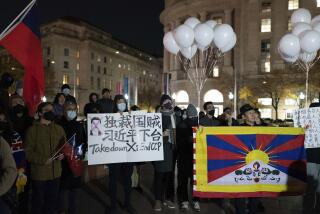China land reform drops off radar
- Share via
BEIJING — A funny thing happened on the way to the Third Plenary Session of the 17th Central Committee, where China’s Communist Party leaders were expected to finally enact a bold land reform program allowing farmers eventually to buy, sell or lease their fields.
Coverage of reform issues had been stepped up in the official press. And President Hu Jintao made a high-profile trip to rural Anhui province, where state media said he told farmers that they would be able to transfer their land rights.
Yet by the time the closed-door meeting wrapped up Sunday, the issue had all but disappeared from public view. It wasn’t even mentioned in the final communique from the 368-member decision-making body.
That has led some analysts to speculate that hard-liners who benefit from the status quo managed to fight off the reforms. Others say that, given the vague nature of many Chinese official statements, the measures still may be implemented.
At stake is a system of ownership restrictions that hinders China’s 740 million farmers trying to improve productivity, often leaving them at the mercy of corrupt local party officials.
“I’m very disappointed,” said Hu Xingdou, an economics professor at the Beijing Institute of Technology. “The government and top leaders are so focused on harmony these days that they just give up when they face resistance. They need to try harder.”
Land reform efforts have foundered for decades in part because the issue encapsulates many of modern China’s fundamental contradictions. In spite of a roaring market economy, leaders of this nominally Communist country maintain a collective land ownership system.
Some Communist hard-liners say enhanced ownership rights would solidify Western capitalism, undercutting the party’s grip on power. Others argue that they would prompt the mostly uneducated farmers to sell their land for a song, and eventually drift into the cities, homeless and penniless.
Delay also carries a cost. The system has allowed corrupt local authorities to grab huge swaths of land from farmers at a fraction of its value, spurring indignation, riots and unrest. And farmers have little incentive to upgrade the land.
Hu and Premier Wen Jiabao spent much of their careers in the countryside. They understand the farmers’ plight and want to make changes, said a long-standing Communist Party member who asked not to be identified.
But this is an extremely complex social problem, he said, and intent isn’t enough. It requires a solid legal framework and the political will to implement such wide-ranging change.
“Deng Xiaoping dared to enact reforms,” he said, “but Hu Jintao can’t do it at this stage.”
In a short statement Sunday, China’s state news agency said the Central Committee passed a package of rural policies and discussed the global financial crisis. But it made no mention of land reform. The communique referred vaguely to “raising land yields.”
The package also aims to double rural incomes by 2020. Annual per capita disposable income for those living in the countryside was $720 during the first half of 2008, compared with about $3,600 for city dwellers.
Sui Yuyou, a farmer in Shandong province, said he’s pleased with the government’s focus on rural issues. The four-acre family plot, shared by six adults and two children, gets an $80 wheat subsidy per year, a welcome addition to about $2,400 that crops bring in.
But if rural incomes were higher, Sui and his relatives might not need to spend any time in Beijing, where they can earn as much in a month waiting tables as they can in a year in their village, about 250 miles southeast of the capital.
Sui, wearing cloth shoes and a black jacket, leans against a barrier near the Beijing railway station and reflects on his double life, split between the capital and the family’s small plot in Suijiagou village, where he grows peanuts, wheat and soybeans.
Sui said looser policies on buying, selling or offering up his land as bank collateral would make life easier, allowing for bigger farms that could be more productive.
“But I would never sell my land easily,” the 56-year-old said. “Land is a farmers’ fate. We farmers rely on the land to make a living.
“My village is famous for its beautiful scenery, mountains, hills, rivers and flatlands,” he said. “But nearly 80% of the young people head to the cities to make a living. Those left are mostly kids and old people.”
Analysts say land reform has even broader economic implications during these times of global crisis.
China, the world’s most populous country, has an advantage over many nations in labor-intensive industries such as manufacturing. But services and an improved agricultural sector are important not only to stem unemployment and social tension, but to improve economic productivity, said Stephen Green of Standard Chartered Bank.
“There has obviously been a lot of investment in rural areas, schools and healthcare,” he said. “But you can’t just subsidize the countryside into modernity. You need land reform.”
--
More to Read
Sign up for Essential California
The most important California stories and recommendations in your inbox every morning.
You may occasionally receive promotional content from the Los Angeles Times.













